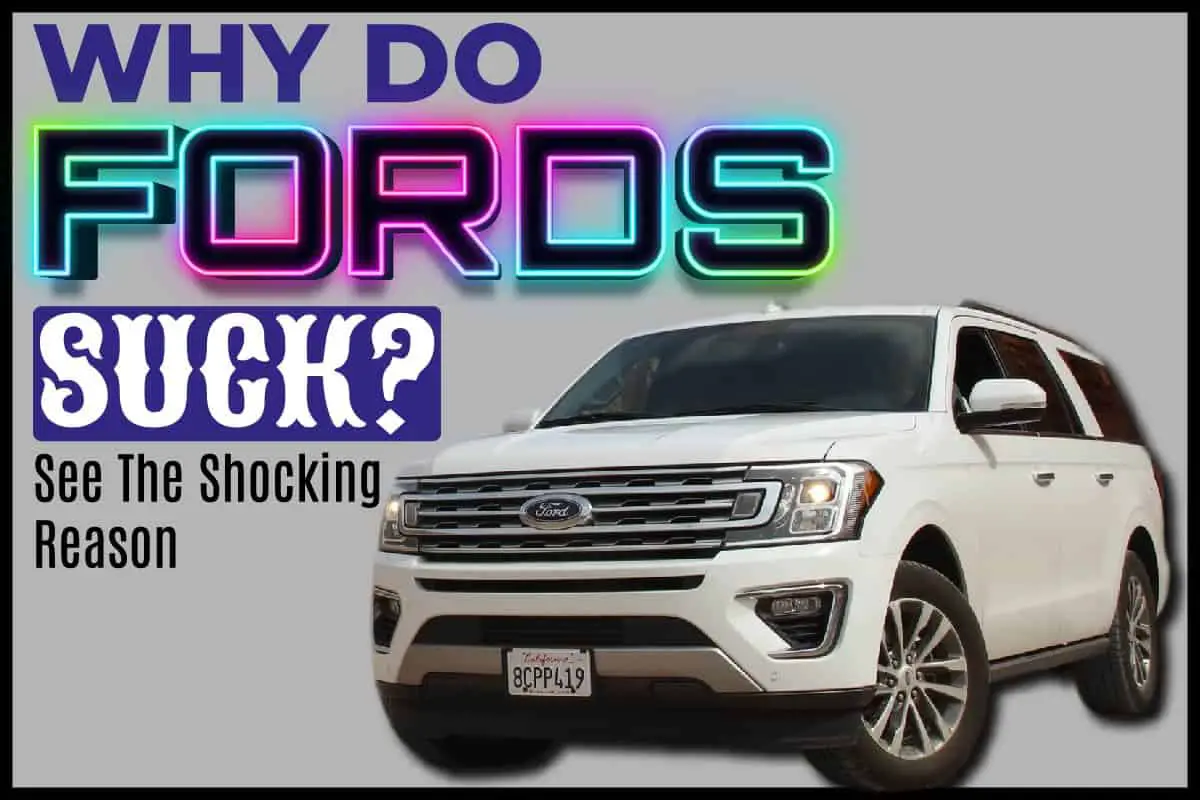Ford is an American-based automobile production company. The company, since its inception, has spawned over two centuries producing famous automobile brands like the Ford Mustang and the Lincoln.
As of 2020, Ford had about 13.1% of the US vehicle market share, selling more than 2 million units. Although a popular brand, users have, over time, laid several complaints concerning several Ford models. Reliability has been a downside for Ford relative to other vehicle brands.
So, here’s the question.
Why Do Fords Suck?
Fords have consistently remained at the bottom when issues of reliability are put into consideration. Although a well-known American brand, their products tend to come with a lot of problems.
Fords users have had one or more reasons to lay complaints concerning their automobiles. Some of the problems associated with Ford brands include vehicle jerking, pulling off of doors, oil leakage, and safety issues, amongst others.
Let us consider some of them.
1. Major oil leaks:
Oil remains an essential part of keeping cars healthy and running. Over time, some Ford models have been reported to be prone to oil leaks. Users have consistently had to deal with oil leaks. One of the Ford models known mainly to be prone to oil leaks is the Ford Aerostar.
2. Transmission roll pins:
Crucial to the efficient running of a car, transmission roll pins have remained an issue peculiar to Ford models like the F-50. A recall of this model was made in 2017 as the ten-speed transmission fitted on it remained a major problem.
3. Safety for kids:
Safety is an issue that we shouldn’t take lightly, and when it concerns kids, more issues are raised. In 2013, 10,000 Ford vehicles had to be recalled due to malfunctioning of some of the rear door child locks.
4. Vehicle jerks:
The uncontrollable up and down movement of the 2003 Ford Explorer has remained a terrible experience for Ford users. The 2016 F-150 has also been reported to have uncontrollable jerk issues.
5. Doors flying off:
Doors play a vital role as the part of a car as it ensures the safety of the car’s occupant. The Ford F-series, however, had to be recalled as the doors usually flew off mid-journey. Can anything be scarier than this? I don’t think so!
About Ford
Ford is an American automobile manufacturing company. It was founded by Henry Ford, with its main headquarters in Dearborn, Michigan.
The company produces and sells commercial automobiles under the Ford brand name and luxury cars under “Lincoln.” Apart from the United States, the company is also present in other countries.
The company owns stakes in global brands like Troller, the Brazilian SUV manufacturer, United Kingdom’s Aston Martin, and China’s Jiangling Motors.
The company also has joint ventures in various countries like China (as Changan Ford), Taiwan (as Ford Lio Ho), Thailand (as Auto Alliance Thailand), and Russia (as Ford Sollers).
The Ford family is in control as they possess a majority of the voting power, even with minority ownership.
Ford is the second-largest automobile manufacturing company in the United States and the fifth-largest in the world. However, the beginning of the 21st century saw the near-collapse of Ford during the period of the financial crisis.
President George Bush helped prevent this by announcing his emergency financial rescue plan to help Ford Motors, Chrysler, and General Motors. He made available $13.4 billion to the automobile manufacturers.
Ford has produced about 5.532 million automobiles, employing about 213,000 individuals and owning about 90 plants and facilities worldwide.
History Of Ford
The history and evolution of Ford have spanned two centuries. The history of Ford can therefore be divided into two eras – the 20th and 21st-century eras.
The 20th-Century Era:
Henry Ford founded Ford on his first attempt at car manufacturing on the 3rd of November 1901. Ford exited the company on the 22nd of August, 1902, the company. The company later became the Cadillac Motor Company.
The Ford Motor Company was launched a year later with $28,000 from twelve investors in a converted factory. The most notable investors were John and Horace Dodge, who later left to start their own car company.
Local banker John Gray was appointed as the company’s first president instead of Ford. Investors feared Ford would leave the new company just as he had left the previous one.
Companies contracting for Ford supplied parts which two or three men assembled.
Ford contributed immensely to the development of affordable automobiles for the middle class, introducing the first moving assembly line at Ford’s Highland Park factory in 1913.
In 1939, Ford created the Mercury brand as a direct competitor to General Motors’ mid-range Pontiac, Oldsmobile, and Buick models.
Ford acquired Jaguar and Aston Martin in 1990 and 1994, respectively. In 1999 Ford purchased the Lincoln Company to compete with luxury brands like the Cadillac and Packard.
In 1929, Soviet Government contracted Ford Motors to build the Gorky Automobile Plant in Russia. This step helped play an important role in the industrialization of the country.
Henry Ford was just 39 years old when he founded the Ford Motor Company. The company rose to become one of the world’s largest and most profitable automobile companies.
The 21st-Century Era:
By 2005, certain factors like high US health care costs for an aging workforce, increasing gasoline prices, eroding market shares, and others led to the downgrading of Ford and General Motors’ corporate bonds.
Later in 2005, Chairman Bill Ford asked the newly appointed president of the Ford America division, Mark Fields, to develop a plan to make the company more profitable.
On the 7th of December, 2005, the plan named “The Way Forward” was previewed by Mark Field in the company’s board meeting. Ford unveiled the plan to the public on the 23rd of January 2006.
This plan included modifying the company’s size, dropping some inefficient car models, closing 14 factories, and cutting about 30,000 jobs.
The company released a new vehicle range, including the Crossover SUVs and the Ford Escape Hybrid SUV. In 1998, William Clay Ford Jr, great-grandson of Henry Ford, was appointed the company’s executive chairman.
After the departure of Jacques Nasser in 2001, William Jr. became the Chief Executive Officer of the company. In 2006, Ford reported its largest annual loss of $12.7 billion, predicting that it would not profit until 2009.
However, the second quarter of 2007 saw the company posting a profit of $750 million. Despite the recorded gain, the company recorded a loss of $2.7 billion, mainly due to its finance restructuring at Volvo.
On the 2nd of June 2008, Ford sold Jaguar and Land Rover to Tata motors for a whopping $2.3 billion.
The company also announced plans to modernize its Dearborn Engineering and headquarter campuses in April 2016. The vehicle maker announced its discontinuation of passengers’ cars in North America except the Mustang for the next four years on the 25th of April 2018.
Ford Products
Ford remains a major player in the vehicle manufacturing industry. Some of its products include the following.
Automobiles:
Ford sells a wide range of automobiles under the Ford brand and Lincoln brand worldwide.
During its history, Ford sold other brands like Mercury, introduced in 1939; Edsel, introduced in 1958; and Merkur, introduced in 1985. Ford in 1989 acquired Aston Martin, which they later sold on the 12th of March 2007, although retaining 8% of the company.
The company also purchased Volvo cars in 1999, which they later sold to Zhejiang Greely Holding Company in 2010.
Trucks:
Ford began its production of trucks in 1908, starting with the Ford model TT, then followed by the AA the BB models.
The F-series was used as the base for light trucks for the North American market from the 1940s to the late 1970s. In 1999, Ford temporarily stopped its production of medium-duty trucks.
Ford is the manufacturer of the Transit, which has a payload of about 2,268kg and is classified as a large goods vehicle. The Ford Ranger is the light van version of the Ford Transit.
Buses:
Ford manufactured full buses earlier in its history but is now a second-stage manufacturer. The Ford E-series remains the company’s model for small school buses, while the F-650 is used as commercial buses in North America.
Ford also makes the Transit Minibus, considered in Europe as a passenger-carrying vehicle with options of 12-, 15- or 17- seaters.
Tractors:
The company began its production of Fordson tractors in Spring Wells, Michigan, in 1907. After a brief pause, Ford re-launched its tractor line with the production of the Ford N-series tractor in 1939. The most popular tractor of all time in North America, the Ford N8 was launched in 1947.
Conclusion
Ford is an American-based automobile production company founded in 1939. Ford products range from small cars to trucks and buses. As of 2020, Ford has a 13.1% market share in the US vehicle market.
Although a popular brand, users have, over time, laid several complaints concerning several Ford models.
Reliability has been a downside for Ford relative to other vehicle brands. Although a well-known American brand, their products tend to come with a lot of problems.
Some of the problems associated with Ford brands include vehicle jerking, pulling off of doors, oil leakage, and safety issues, amongst others.
You May Like These Articles As Well:
Do Competitive Eaters Purge After? What You Should Know About Competitive Eating
 Being Human
Being Human




